
Reading about Black Elk, Sitting Bull, Geronimo and countless other Indian tribal elders and chiefs made me regret that I would never know them. They had vanished and with them a way of relating to others we can call emotional intelligence. Not the intelligence that rates at the top of the SATs or earns a huge salary in a financial management firm. This kind is harder to measure. Humanistic rather than materialistic, it can crudely be called “heart smart.” Sometimes it brings wealth but not necessarily. It is more likely to bring honor and you can’t take honor to the bank.
When my filmmaker husband landed a series on American Indians today, we immediately planned a family trip that would offer a rare exposure to the tribes. Depicting Indian life today was to be positive—no talk of the widespread alcohol and drug problems, the unemployment, the suicide rate among the young men. The publisher wanted a feel-good view of Indian life today showing the success of the American melting pot.
But the tribes featured in the first episode in the series, the Five Tribes of the South East, had been driven from their territory on the Trail of Tears in 1865 and were now on reservations in Oklahoma. Was there anything left of their traditional life or their towns?
Maybe we could find something in the Great Smoky mountains in North Carolina, where the Eastern Band of the Cherokee went into hiding in the forests to escape being deported. They lived there still. Maybe we could film them.
If Indians remained in the town of Cherokee, N.C., however, they certainly weren’t advertising their existence. We stopped for gas in Cherokee and two locals working at the pumps adamantly refused to be photographed.
“Hey you got our land, right. But you sure can’t have my picture,” one said.
“No way,” echoed the other. They kept their heads down, making a photo impossible.
We scattered in the town, looking for something to shoot. Wandering alone down the short Main Street I saw a crude hand-lettered sign: “Indian dances—$3.00.” I paid and entered a bare room with two teenage girls in jeans gyrating on a makeshift stage in approximate time to a pop tune. Oh, well, it was only $3.00 lost—but something made me stay.
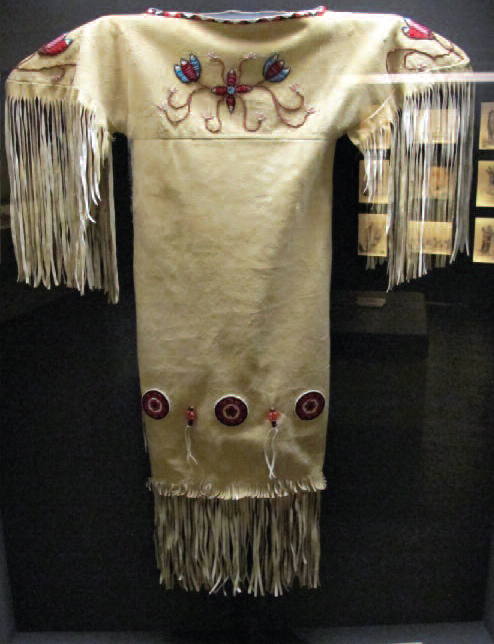
Abruptly the music changed and a young Indian man in full buckskin regalia thundered onto that little stage. The room crackled. He was miming the step of a prairie hen and his whole body fluttered and his head bobbed up and down with each step; he had become that bird. I had never seen real Indian dancing but I knew beyond doubt that I was seeing it now. His buckskin pants and shirt were heavily embroidered in porcupine quills, beading outlined his gauntlets and moccasins. A majestic feathered headdress, beautiful if totally inauthentic, as it belonged to the Plains Indians, completed his outfit.
As soon as his set was over I tried to engage him in conversation. Who had taught him to dance like that? I asked.
“My father died young,” he explained. “My uncle taught me.”
“And your costume, where did you get it?”
“My aunt, she embroidered it all for me.”
We had come to find Indians and here was the genuine article, young, handsome, and able to dance. All I had to do was persuade him to come with us, that we were a film crew not some weird or dangerous strangers. I told him we were headed to a regional pow wow in Mississippi where an Indian dance contest carried a $1,000 prize.
“I’m pretty sure you could win it—I know you can—and you can ride down there with us,” I explained, trying to look as normal and non-threatening as possible. “We are a film crew.”
I could see he did not believe me, so I led him over to a notice for the pow wow hanging in the local post office. He studied it carefully. Finally he nodded.
“We leave tonight,” I said. “You can meet us at the bus station at 6:00 P.M.”
He said he would be there. He said his name was John Grant.
The crew was skeptical but John was waiting for us when we drove up. He was dressed neatly in pressed jeans and he carried a small pack. He took his place in the way back of the van with our two little boys, our two teenage girls, and the gear. We drove without stopping.
While the children kept up a stream of chatter, John was silent. I hoped he was reassured by their normality, and less afraid of us. But there was no way to know. We adults had nothing to say. Bill never spoke when he was driving, and my nephew Phil, just released from the Marines, was trying to smoke through a slit in the window so the fumes would not blow back into the van.
We drove all night. After we had gone far enough we pulled into a roadside diner for breakfast. Dingy, with trucks parked outside, their drivers hanging around the small tables, there was room for us at the counter. A heavy redheaded waitress studied us warily. She came to life when John came in last.
“He got to get out!” she yelled, pointing at him. “I don’t serve no Indians.”
John obediently turned to go, but Phil was not so accommodating. He offered to send the waitress’s teeth down her throat as well as those of her trucker friends if she did not serve all of us. We managed to get everyone out of the diner and back into the van. The reception at the diner seemed to belong to another time and another place, not the summer of 1971.
“Welcome to Mississippi,” Phil said.
We pitched two tents at the fairgrounds. Supposedly the pow wow (“a gathering of the tribes”) was an event for Indians but in fact they were restricted to certain areas and not allowed in the stands where the paying customers sat.
“I can’t believe what’s happening,” I said.
“Welcome to Mississippi,” Phil said again.
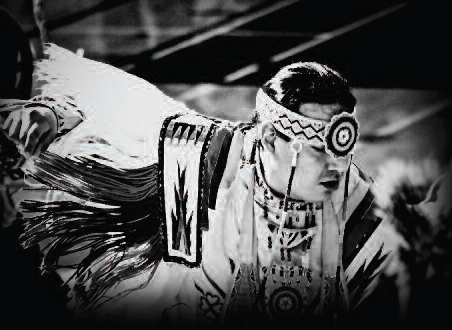
The pow wow sprawled across a football field with booths ringing the stadium and some bleachers at one end. A constant din of music emanated from the loud speakers, rock and country music alternating with some Indian chants.
But the Native American tribes who constituted the attraction were denied admission to various areas that were restricted to tourists only.
It was equally fake on our end, however, with our photographer staging cameos as if authentic Indian life still existed. What actually remained? A small population, mostly dirt poor. Still, they seemed pleased to be allowed on the fair grounds at all, to set up stands for Indian food and remnants of crafts like canoe-making and blowgun contests. Women quilted and sold fry bread and green corn soup.
We rigged two tents, a big one where the girls and I slept. A smaller tent housed the men, and John made his place there. He spoke very little but he was quick to help out without a lot of talk.
John was our magic carte d’admission to the Indians. The local boys immediately took to him. Truth to say we all fell in love with him. He was a natural athlete, handsome and kind, easily winning the foot races and blowgun contests at the various booths.
Our children followed him wherever he went around the fairground. The local young Mississippi Indians recognized him as their ideal; his confidence so different from their own deep submission. He seemed a son of the unconquered, and they regarded him with enormous pride and trailed him around as our children did. The fact that he was tenting with us gave us standing and a contact with them.
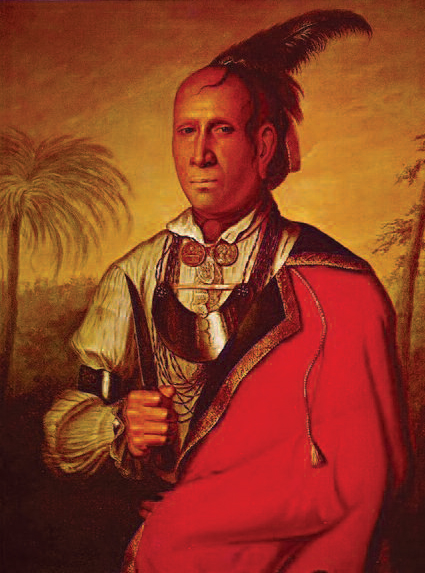
Cunne Shote, 1762
John taught us to recognize traditional Indians, where they lived, the signs they left for each other. He showed us how to find our way to a pow wow that was not open to tourists, by roadside signs, everything in plain sight, yet unseen.
The last night of the pow wow the dance contest was held. The $1,000 prize loomed large in the land of Mississippi and only the local high-school auditorium was large enough for the crowd.
A torrential rain accompanied us to the contest and we were thoroughly wet when we pushed our way to the front row, the better to photograph from. The auditorium was packed. Three judges sat on the stage waiting for the contest to begin.
Recorded music from some earlier time played on a phonograph. A social dance, a men’s dance, and a war dance were all to be judged. As the boys stamped and spun, the music would suddenly stop and all would freeze. Any movement, however slight, immediately disqualified a dancer, who would be waved off the stage by one of the judges. A fallen feather was an instant out. Dancers were judged on skill, style, and costume.
Women did not dance. A thunderous rain rattled the windows and added drama to the contest.
The contest music started. The dancers filed in—eight local boys, John, and a tall, older Pawnee who had traveled down from Oklahoma for the prize money. But what was this? Every one of the Native boys was wearing a piece of John’s splendid costume. One wore his vest, another his chaps, a third proudly brandished his beaded gloves. John had only his headdress and his moccasins. He danced bare chested in faded jeans like the rest of the boys.
The Pawnee, however, was gorgeously attired, his pants and shirt quilled and beaded: a very fine dance costume. We groaned. Would John lose the contest to the older man? But John danced with his customary assurance and speed. Imbued with a kind of spirit, each boy put heart into his moves and none was eliminated for a long time. The packed auditorium roared and cheered them on. The rain pounded and lightning streaked through the windows. The Chicken Dance, a social dance, and finally the big finish, the War Dance, ended. Silently the boys waited on stage as the three judges conferred. They reached a decision quickly and surrounded John and gave him an eagle feather, signifying that he had won.
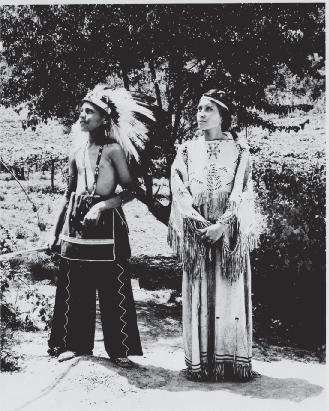
on reservation, North Carolina, 1939
Pandemonium! The audience swamped the stage and John disappeared in a crowd of well wishers. We thought we would not see him again.
We straggled to our big tent soaked, trying to process the evening, trying to find enough clean dry clothes for everyone. It was near midnight and we wondered when the children would stop talking so despite the damp bedding all could sleep. Then the tent flaps lifted. John had come back to us.
Sitting cross-legged in our midst, he began to speak and continued for quite a long time, explaining all he had experienced since he met us in Cherokee.
“When I met you people I did not know what you had in mind for me. I thought maybe you were planning to hurt me or drop me somewhere on the highway. But I took a chance.” Removing his moccasin he took out the lining and held up a folded twenty-dollar bill he had hidden there.
“So just in case, I had a way to be O.K.”
He smiled apologetically for not trusting us.
“What happened to your costume?” one of the children interrupted. “Did the other kids steal it?”
“I divided with everyone,” he said. “It’s not right if one has everything and the others nothing.”
“Did you get the money?” our children demanded.
“I divided five hundred among all the other boys and I kept five hundred,” he said.
“But your college money!” our boys protested.
“This way nobody feels bad. Nobody feels like they lost,” John explained.
Is that the Indian way? I wondered, or is it just John?
As if he heard my thought, John said, “The edges must be even.”
Then he reached into a sack and began to distribute presents to all of us: For the boys, blowguns and darts, for the girls Seminole ribbon skirts and a matching purse for me. Pipe tobacco for the men.
John waited until the hubbub of thanks subsided, then said: “I have to go now—the gospel singers’ bus will drop me off in Cherokee.”
Our boys clung to his arms and legs, reluctant to let him leave.
John Grant slipped out of our tent as quietly as he had come.
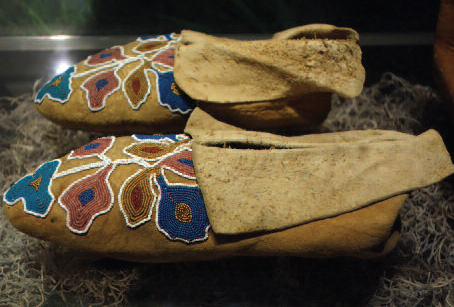
You can’t know, really know another person unless you walk a mile in his moccasins, the saying goes. But if you try to imagine a walk in those moccasins and feel the same pain, you may feel for an instant that the two of you are one and the same. Then all you need to live with honor is to remember that the edges must be even.♦
